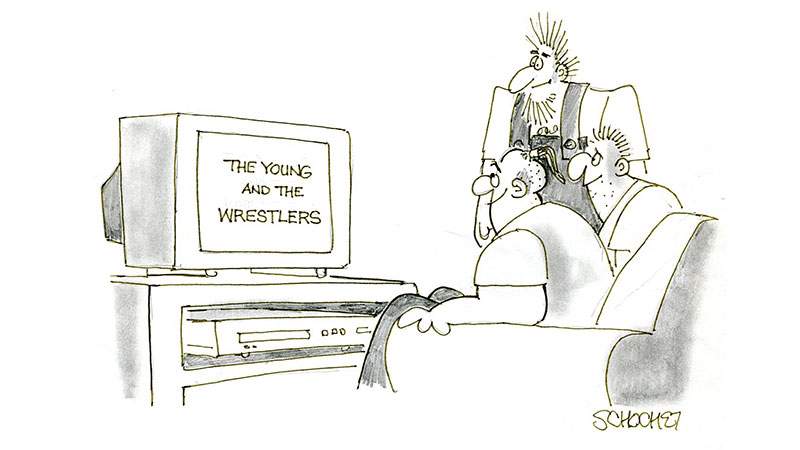In a highly competitive U.S. television marketplace, what does it take to be the best? At the recent Television Critics Press Tour, each of the U.S. network presidents talked about working on their Achilles heels, i.e. the areas most in need of improvement.
“This is a time for rebuilding at FOX and for networks in general,” confessed Dana Walden, chairman and CEO of FOX Television Group. “Broadcast shows have not been the flavor of the month over the past few years, and for good reason. There were shiny new services that wowed you, and cable programmers who won your attention with fantastic shows that would never have survived on broadcast. Five years ago, they were doing much less programming than the networks, nurturing just a few series … but the playing field has leveled. There’s been an explosion of content, and now everyone is in the volume production business.”
Walden continued: “We all take a lot of swings, some hits and some misses. But standing here today, I feel like we have a slate of new shows that stand up to the best of anything being produced on any platform. And we’re in the midst of a turnaround at FOX … While we think our slate is strong and we have some momentum, it’s no longer enough to have great content. We spend a lot of time focused on the future of the broadcast business, and we’re moving in the right direction. We’ve made a lot of progress making our programming available to our viewers wherever and whenever they want it.”
Walden said that peak TV (i.e., the notion that TV has reached the peak amount of original shows possible, and that collapse is imminent) is a challenge. “A lot of the best creators are trying to staff shows with experienced writers who can deliver on an episodic order that works for broadcast — and that’s no longer 22 or 24. You still need to be able to platform enough episodes to feel like a broadcast show. I find that to be the challenge, but we are producing 50 shows at the studio, and I feel pretty good about the creative talent behind virtually every one of those shows.”
CBS is trying to increase diversity in their television shows, both in front of the camera and behind the scenes. While the network has many African-American and Latino supporting actors, CBS does not have people of color as the leads of their fall television series. But Glenn Geller, president of CBS Entertainment, noted that they are “very mindful” about the importance of diversity and inclusion.
“We need to do better and we know it … we [were] definitely less diverse [last fall] than [the previous] year … in terms of overall diversity in our new shows, our ensemble diversity, we [were] actually more diverse [last] year than [the previous] year. And that’s our commitment to diversity. It is ongoing.”
Geller said that behind the camera the network is getting better in this area. “Our writers are more diverse than [in 2015], as for our directors, and we’re not finished booking every slot, but we’re on track to be more diverse [in 2016] than [the previous] year. We continue to put additional resources and financial support into our CBS Diversity Institute, and that covers many different parts of diversity for us. That’s our showcase, and it’s kind of the gold standard in the industry. Many people cast from it. It includes our writers program. It includes our directors program. And even the Director’s Guild of America has kind of held them up as premiere programs that really make effective and real change.”
The network also has CBS On Tour, where they go out to colleges and talk to graduates about opportunities in television.
“We provide them access and information, and that leads to diverse individuals having a shot at getting a job,” said Geller. ”One day they could be in a key decision-making role, where diversity can foster more diversity. And that is our commitment. It’s much more of a 360-degree approach.”
Geller is also working on diversifying the sexuality representation on CBS. “Things are definitely shifting. In terms of LGBT representation, we have more LGBT characters on this coming year than ever before. We have in our newer series, especially on Bull, and The Great Indoors. In the second year of Code Black, Malaya on the show is a lesbian. Vanessa Ferlito, who we cast in NCIS: New Orleans, her character is a lesbian and they’re doing a storyline a little later in the fall where the audience will understand that and see that. And Laverne Cox in Doubt is a historic role. She’s the first transgender actress ever to play a transgender series regular character. That is huge. And I think as we continue to put new shows on the air, those trends will continue, and I’m very proud of that.”
ABC Entertainment’s new president, Channing Dungey, is also dealing with the issue of diversity, with long-running reality series The Bachelor. “I would very much like to see some changes there. And one of the biggest that we need to do is increase the pool of diverse candidates in the beginning, because part of what ends up happening as we go along is there just aren’t as many candidates to ultimately end up in the role of the next bachelor or bachelorette. So that is something we really want to put some effort and energy toward.”
Dungey is also getting used to her new role. “Coming in in the middle of pilot season was challenging, especially getting up to speed with all of the comedies and understanding exactly what we were doing in that space,” she said.
Still she’s up for the challenge. “People talk a lot about peak TV, and it’s true, there are more scripted shows than ever before, but in a way, that to me is the exciting part of about what we do to be a part of telling those stories … finding wonderful voices that have things that they want to share and helping be a part of bringing that to life. And we always pride ourselves at ABC on being the home of passionate storytellers. We want to give our writers the freedom to tell the stories in the best possible way and to give them our fullest support. When we find something that we really love, that speaks to us, we do everything that we can to make it happen.”
NBC’s lineup has solidified so much that the network only launched two new dramas and one new comedy last fall. “NBC has defied a lot of the doom and gloom, downward trends we’ve been hearing about network television for the past few years,” said Robert Greenblatt, chairman, NBC Entertainment. “In fact, we’re thriving in an era of unprecedented change, and our slate of entertainment programs has actually generated ratings gains for the last three years in a row.”
Still, Greenblatt and Jennifer Salke, president of NBC Entertainment, acknowledged the network has had a few misses, and as a result, have learned a lot about programming comedy.
“The thing that we learn about comedy every single season is it’s really a hard genre to launch, no matter how good the shows are,” Greenblatt said. “So we’re trying to be very careful and very strategic about it.”
Salke added: “We came in at a time where some of those loved comedies were sort of finding their natural ending and moving out. And the goal was to raise ratings at a time where people were starting to watch less comedy in a linear way. So it was sort of a perfect storm of things, of us trying to get more people, [with] less people watching that way. And the lessons learned from it and I know we all did learn them, was that you should still go for the sophisticated, smart, great creators’ point of view and get behind that. You might not please everyone; comedy is polarizing by nature. Do something really excellent that works for a large group of people, but don’t try to sort of end up in the middle.”
(By Susan L. Hornik)
Audio Version (a DV Works service)












Leave A Comment